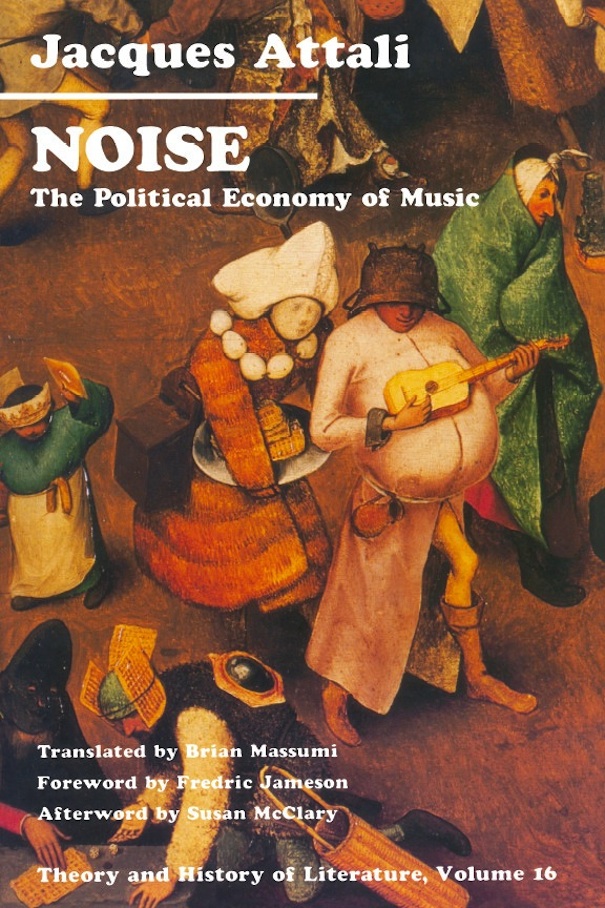Caleb Kelly: Cracked Media: The Sound of Malfunction (2009)
Filed under book | Tags: · experimental music, glitch, music, music history, noise, sound recording

From the mid-twentieth century into the twenty-first, artists and musicians manipulated, cracked, and broke audio media technologies to produce novel sounds and performances. Artists and musicians, including John Cage, Nam June Paik, Yasunao Tone, and Oval, pulled apart both playback devices (phonographs and compact disc players) and the recorded media (vinyl records and compact discs) to create an extended sound palette. In Cracked Media, Caleb Kelly explores how the deliberate utilization of the normally undesirable (a crack, a break) has become the site of productive creation. Cracked media, Kelly writes, slides across disciplines, through music, sound, and noise. Cracked media encompasses everything from Cage’s silences and indeterminacies, to Paik’s often humorous tape works, to the cold and clean sounds of digital glitch in the work of Tone and Oval. Kelly offers a detailed historical account of these practices, arguing that they can be read as precursors to contemporary new media.
Kelly looks at the nature of recording technology and the music industry in relation to the crack and the break, and discusses the various manifestations of noise, concluding that neither theories of recording nor theories of noise offer an adequate framework for understanding cracked media. Connecting the historical avant-garde to modern-day turntablism, and predigital destructive techniques to the digital ticks, pops, and clicks of the glitch, Kelly proposes new media theorizations of cracked media that focus on materiality and the everyday.
Publisher MIT Press, 2009
ISBN 0262013142, 9780262013147
392 pages
Download (removed on 2013-12-5 upon request of the author)
See Caleb Kelly’s Cracked and Broken Media in 20th and 21st Century Music and Sound, 2006 (added on 2014-2-19)
Jacques Attali: Noise: The Political Economy of Music (1977–) [FR, EN, ES, TR]
Filed under book | Tags: · cultural economy, cultural production, music, music history, noise, political economy

“Attali’s essential argument in Noise: The Political Economy of Music is that music, as a cultural form, is intimately tied up in the mode of production in any given society. For Marxist critics, this idea is nothing new. The novelty of Attali’s work is that it reverses the traditional understandings about how revolutions in the mode of production take place.
Attali believes that music has gone through four distinct cultural stages in its history: Sacrificing, Representing, Repeating, and a fourth cultural stage which could roughly be called Post-Repeating. These stages are each linked to a certain “mode of production”; that is to say, each of these stages carries with it a certain set of technologies for producing, recording and disseminating music, and also concomitant cultural structures that allow for music’s transmission and reception.”
French edition
Publisher PUF, Paris, 1977
301 pages
English edition
Translated by Brian Massumi
Foreword by Fredric Jameson
Afterword by Susan McClary
Publisher Manchester University Press, Manchester, 1985
Theory and History of Literature, Volume 16
ISBN 0719014719, 9780719014710
179 pages
Reviews: Edinburgh Review (1986), Dana Polan (SubStance, 1988), Ronald M. Radano (Ethnomusicology, 1989), Steven Shaviro (2005), notbored.org (n.d.), J. Szigeti (2014).
Outline: Theodore Gracyk.
Commentary: Eric Drott (Critical Inquiry, 2015).
Bruits: essai sur l’economie politique de la musique (French, 1977, added on 2021-4-11)
Bruits: essai sur l’economie politique de la musique (French, new ed., 1977/2001, added on 2013-9-25, updated on 2021-4-11)
Noise: The Political Economy of Music (English, 1985, updated on 2012-7-24)
Ruidos: ensayos sobre economía política de la música (Spanish, trans. Ana María Palos, 1995, updated on 2021-4-11)
Gürültüden müziğe: müziğin ekonomi-politiği üzerine (Turkish, trans. Gülüş Gülcügil Türkmen, 2005/2014, EPUB, added on 2021-4-11)
Karin Bijsterveld: Mechanical Sound: Technology, Culture, and Public Problems of Noise in the Twentieth Century (2008)
Filed under book | Tags: · music, noise, psychoacoustics, sound recording, technology

“Since the late nineteenth century, the sounds of technology have been the subject of complaints, regulation, and legislation. By the early 1900s, antinoise leagues in Western Europe and North America had formed to fight noise from factories, steam trains, automobiles, and gramophones, with campaigns featuring conferences, exhibitions, and “silence weeks.” And, as Karin Bijsterveld points out in Mechanical Sound, public discussion of noise has never died down and continues today. In this book, Bijsterveld examines the persistence of noise on the public agenda, looking at four episodes of noise and the public response to it in Europe and the United States between 1875 and 1975: industrial noise, traffic noise, noise from neighborhood radios and gramophones, and aircraft noise. She also looks at a twentieth-century counterpoint to complaints about noise: the celebration of mechanical sound in avant-garde music composed between the two world wars.
Bijsterveld argues that the rise of noise from new technology combined with overlapping noise regulations created what she calls a “paradox of control.” Experts and politicians promised to control some noise, but left other noise problems up to citizens. Aircraft noise, for example, measured in formulas understandable only by specialists, was subject to public regulation; the sounds of noisy neighborhoods were the responsibility of residents themselves. In addition, Bijsterveld notes, the spatial character of antinoise interventions that impose zones and draw maps, despite the ability of sound to cross borders and boundaries, has helped keep noise a public problem. We have tried to create islands of silence, she writes, yet we have left a sea of sounds to be fiercely discussed.”
Publisher MIT Press, 2008
ISBN 0262026392, 9780262026390
350 pages
Keywords and phrases
Anti-Noise, decibel, industrial noise, dB, National Physical Laboratory, noise abatement, Dutch, Netherlands, Art of Noises, earplugs, player piano, gramophone, World Soundscape Project, Trevor Pinch, Rotterdam, North Brabant, ICAO, Barry Truax, psychoacoustics, Breda
PDF (updated on 2021-4-11)
Comment (0)
